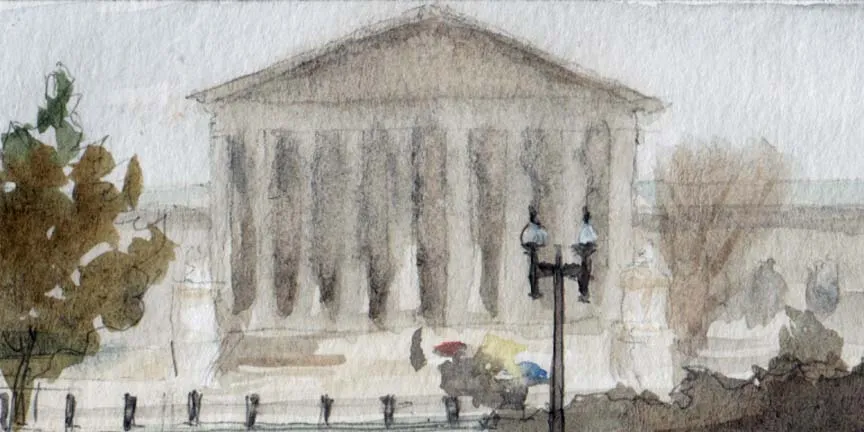Tuesday round-up

on Nov 13, 2018 at 7:01 am

In a podcast at Howe on the Court, Amy Howe “look[s] back at some of the events of the week of November 5 at the Supreme Court, including the first opinion of the term, the formal investiture of Justice Brett Kavanaugh, and the announcement that 85-year-old Justice Ruth Bader Ginsburg had broken three ribs in a fall at her office.” At Vox, Julia Belluz notes that Ginsburg has “lived through many personal and familial medical dramas — all of which she’s bounced back from.” At BBC News, Jessica Lussenhop describes how “Ginsburg [went] from celebrated legal scholar to full-blown celebrity.” Another look at Ginsburg’s health scare and the rest of last week’s Supreme Court news comes from Dan Epps and Will Baude in the latest episode of First Mondays (podcast).
At CNN, Joan Biskupic writes that “Kavanaugh appears to be lying low after the volatile confirmation process and buttressing Roberts’ efforts to move the court away from the white-hot media spotlight,” but that “[t]he record of Kavanaugh, 53 and appointed for life, will become clear only over many months and years.” At National Review, John Yoo and James Phillips hope that the court, “with Kavanaugh now there, … might just have the moxie to make the hard choice of correcting its indefensible privacy jurisprudence” by “putting a stake in the heart of ‘substantive’ due process.”
Briefly:
- Kimberly Robinson reports for Bloomberg Law on research showing that “[t]he female members of the U.S. Supreme Court tend to speak up first during oral arguments.”
- More oral-argument analysis comes from Tonja Jacobi at SCOTUS OA, who presents recent research showing that “interruptions between two justices at oral argument are significantly associated with voting disagreement between pair in the eventual case outcome.”
- At The Daily Caller, Kevin Daley reports that “[a] federal appeals court will wait to decide whether Lehigh County, Pennsylvania, violated the Constitution by incorporating a Latin cross into its official seal until the U.S. Supreme Court resolves” American Legion v. American Humanist Association, an establishment clause challenge to the placement on public land of a World War I memorial shaped like a cross.
- In an op-ed for The Washington Post, Joshua Matz criticizes the Justice Department’s “new strategy for defending President Trump’s most controversial policies: Declare an urgent threat to the executive branch, bypass ordinary judicial procedure and rush straight to the Supreme Court.”
- At Empirical SCOTUS, Adam Feldman looks for patterns among the first opinions released each term by the Supreme Court since 1980.
- At The World and Everything In It (podcast), Mary Reichard discusses the oral arguments in Washington State Department of Licensing v. Cougar Den Inc., which asks whether an 1855 treaty exempts members of an Indian tribe from taxes on certain off-reservation commercial activities, and Jam v. International Finance Corporation, about immunity for international organizations.
- Subscript Law offers a graphic explainer for the first opinion of the term, in Mount Lemmon Fire District v. Guido, in which the justices held that the Age Discrimination in Employment Act applies to all state and local governments, no matter how many employees they have.
- In an op-ed for The Washington Post, George Will urges the justices to review Chandler v. Mississippi, arguing that “[c]learly, … the Mississippi court that heard Chandler’s argument for resentencing in light of Supreme Court rulings about sentencing juveniles did not seriously attempt this difficult task.”
- At Good Judgment, Ryan Adler invites court-watchers to forecast the outcome in Timbs v. Indiana, in which the court will decide whether the Eighth Amendment’s excessive fines clause applies to the states.
- At the Florida Court Review, John Cavaliere looks at the cert petitions in Reynolds v. Florida and a group of related challenges to Florida’s capital-sentencing process that ask “how reliable is a jury’s unanimous recommendation when they were told they were only giving an advisory opinion–not rendering an actual, final sentence.”
We rely on our readers to send us links for our round-up. If you have or know of a recent (published in the last two or three days) article, post, podcast, or op-ed relating to the Supreme Court that you’d like us to consider for inclusion in the round-up, please send it to roundup [at] scotusblog.com. Thank you!


